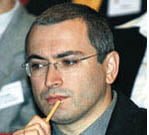When billionaire oil tycoon Mikhail Khodorkovsky was arrested in Siberia on Oct. 25, the Russian economy fell into a state of shock. The country’s wealthiest man and president of Yukos, Russia’s largest oil company, was detained from his private jet by Special Forces and brought to Moscow. He is being charged with embezzlement, fraud, tax evasion and several other charges. He continues to claim that he is innocent and that what he is charged with is not the real reason that the Kremlin (the center of the Russian government) wanted his arrest.
Last Monday, Mikhail Khodorkovsky resigned from his position. Yukos appointed Simon Kukes, the former chairman of the Yukos board of trustees, to Khodorkovsky’s position. In a formal statement he said he resigned in order to comply go with the investigations and to keep Yukos running.
Mikhail Khodorkovsky got into the big business world after the fall of the Soviet Union in the early 1990s. He worked in Moscow for the bank, and made millions when the bank acquired huge amounts of shares in companies that were privatized for bargain prices. He then bought Yukos at a state auction for the reduced price of $350 million (U.S. dollars).
Today, Yukos is a billion-dollar empire and has merged with its formal rival company, Sibneft. Khodorkovsky himself is worth $8 billion. Earlier this year he placed 26th in Forbes magazine’s 476 billionaires.
Khodorkovsky has drawn the attention of the Kremlin and President Vladimir Putin over the years due to his extraordinary wealth, intelligence and open political activism. Khodorkovsky openly opposes Putin and financially supports two opposition parties: Yabloko and the Union of Rightist Forces (SPS).
The Kremlin tried to make a case against Khodorkovsky that Yukos supported the two opposition parties, which is illegal because the company shareholders hold different political views. Khodorkovsky has made it clear that the financial support is directly from him and is not the financial support of Yukos.
Since his arrest, it was clear to politicians and businessmen from Russia and around the world that the intention of Khodorkovsky’s seizure is an attempt to keep him out of power. Putin has denied any comment on the issue, stating that Khodorkovsky is only being investigated for the reasons given for his arrest.
Putin is under serious scrutiny for his actions. Analysts say that Khodorkovsky’s arrest has created the biggest political and economic crisis since Putin took office three years ago.
Many political critics compare the Kremlin’s actions to the days of the communist Soviet Union, when the government arrested and executed many political rebels and no questions were asked.
Critics say these actions are illegal and are in turn a greater threat to Putin and the Kremlin than they are to Mikhail Khodorkovsky and Yukos.
Economically, Khodorkovsky’s arrest and the temporary seizure of Yukos threatens the Russian economy. Almost half of the Yukos shares were frozen by the government, including the 36 percent owned by Khodorkovsky himself. Critics, politicians, and businesspeople agree that this situation runs the risk of dampening enthusiasm for foreign investment and raising questions about whether it is safe to do business in Russia.
Vedemosti, Russia’s leading business newspaper, said in an editorial: “The president should open his eyes and finally discover that prosecutors are destroying in one day what (a democratic, capitalist nation) took years to create.”
But not all are opposed to Putin’s actions. In a recent poll, seventy-three percent of Russians supported Putin’s actions. However, the poll was criticized as biased. “It’s a very difficult situation and there are so many questions,” says Ken Gilmore, Professor of Political Science at Guilford. “It’s believable because this is consistent with Putin’s behavior. He uses powers of the state that we in the states would consider unethical. But maybe in fact (Khodorkovsky) is guilty.”
Though he has resigned from his position, Mikhail Khodorkovsky is still in jail and the investigation is still in process. Putin insists that there is no political motive behind Khodorkovsky’s arrest; that his arrest is based strictly on evidence of financial mismanagement in Yukos. No such evidence has been made available.
Categories:
Arrest of Russia’s rich man causes political controversy
Reid Copeland
•
November 14, 2003

Mikhail Khodorkovsky (www.businessweek.com)
0
More to Discover
